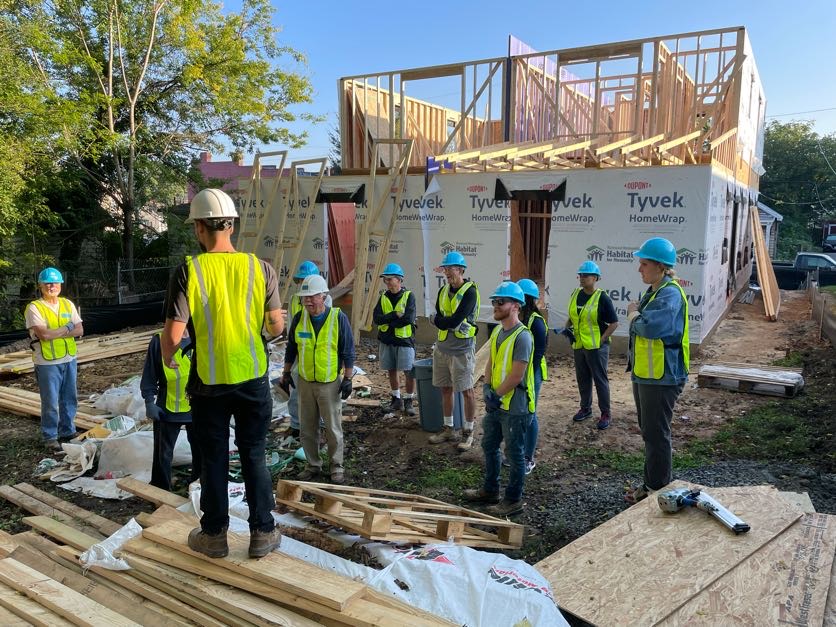By Dave Neary
What if I told you that the most powerful force in your community isn’t money, politics, or policy — but people?
Ordinary people. Your neighbors. Folks who pick up a hammer, serve meals, coach Little League, or simply show up when someone needs a hand. They don’t do it for recognition or a paycheck. They do it because something deep inside them says, “I want to help.” That’s the quiet, powerful heartbeat of volunteerism in Virginia.
Volunteerism is a pure expression of care for others. In a world that too often feels driven by fear and scarcity, volunteering reminds us that abundance still exists — in kindness, generosity and the belief that we are responsible for each other.
Volunteers are everyday heroes who give their time, skills and hearts to build stronger, healthier, more connected communities.
And their impact? It’s extraordinary. According to the latest research from AmeriCorps and the U.S. Census Bureau, more than 75 million people formally volunteered in the United States in 2023, giving over 4.9 billion service hours. These efforts equate to $167.2 billion of economic value.
Here at Richmond Metropolitan Habitat for Humanity, we know the power of volunteers firsthand. In 2024, 2,189 individuals gave their time and talents to help us build homes, communities, and hope. Together, they logged 34,061 service hours — a $1.1 million investment back into the Greater Richmond area.
This incredible impact is captured in the experiences of those who give back to their neighbors. Take Bill Burch of Henrico County, who has volunteered with Richmond Habitat for over 20 years, primarily on build sites. Bill is there for all phases of a house build involving volunteers. He enjoys working with others and often comments on the friendships he’s made with fellow volunteers. Interacting with others and developing relationships are important benefits of service.
Bill says he finds deep meaning from being able to look back and see something tangible that he’s accomplished after a day of volunteering. The most memorable moments for him – and a great many Habitat volunteers and staff – are home dedications, when all who contributed gather to celebrate the home’s completion and present the keys to the family that just purchased it through Habitat’s affordable homeownership program. It’s a moment that underscores the dignity and empowerment of owning a safe, stable, affordable home.
That deep sense of connection is common among volunteers. Before joining Richmond Habitat earlier this year, I served in various roles with Habitat organizations in California and Illinois. My own Habitat journey began more than three decades ago as a volunteer. Over the years, I’ve witnessed the remarkable impact of volunteerism firsthand — from build sites in Long Beach to board rooms in Chicago, from house dedications in small towns to volunteer orientations in bustling cities. No matter the location, the spirit of service and the strength of community were always the same.

And here’s the beautiful thing: Volunteering doesn’t just benefit communities. It benefits volunteers too.
First, research shows that volunteering is good for your health. Doing joyful work provides a sense of purpose and satisfaction. Volunteers feel more engaged with their communities and are generally happier because service yields fulfillment that boosts mood. The Mayo Clinic reports that volunteers often experience reduced stress and lower mortality rates.
Second, volunteering builds connections. As Bill noted, the friendships he’s formed are among the most enduring benefits of service. Volunteering fosters camaraderie and shared values. These experiences help us develop relationships and see ourselves in others. I’ve even known married couples who met on volunteer sites.
Third, volunteering helps combat loneliness. In our modern society, many feel disconnected and isolated. A 2024 Gallup poll found 20% of Americans experienced daily loneliness, and that feeling active and productive is one of the best ways to reduce it. Volunteering fits that prescription; it connects us and gives us purpose, letting us see the results of our work.
So let me ask you, do you volunteer?
If the answer is yes, thank you! But I encourage you to go a step further – invite a friend or family member to join you. If you don’t currently volunteer, now is a great time to start. Volunteerism takes on many shapes and sizes. Find something that interests you and start there. Even if you start small, start today.